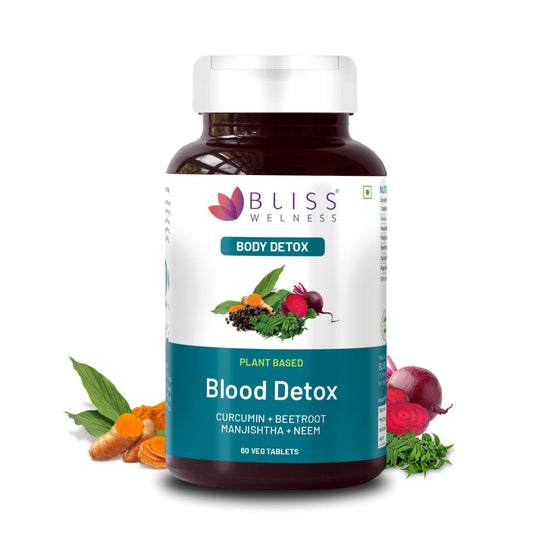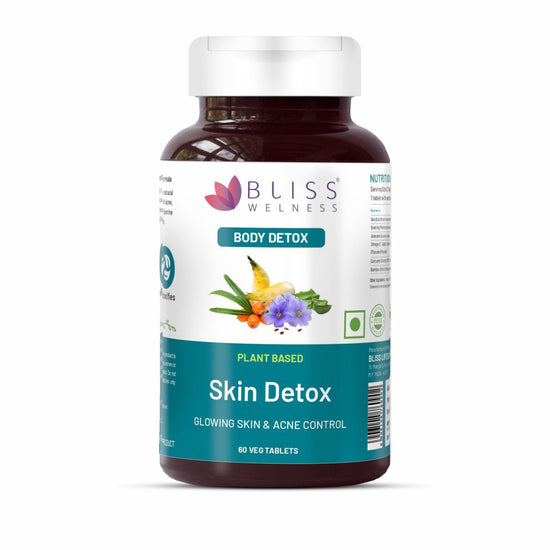2 products
-
Bliss Welness DetoxBliss Blood Detox & Purify Combo of Beetroot Manjishtha Neem & Curcumin Anti Acne & Anti Bacterial & Fungal Supplement - 60 Vegetarian Tablets

 Bliss Welness DetoxBliss Blood Detox & Purify Combo of Beetroot Manjishtha Neem & Curcumin Anti Acne & Anti Bacterial & Fungal Supplement - 60 Vegetarian Tablets
Bliss Welness DetoxBliss Blood Detox & Purify Combo of Beetroot Manjishtha Neem & Curcumin Anti Acne & Anti Bacterial & Fungal Supplement - 60 Vegetarian Tablets- Regular price
-
Rs. 479.05 - Regular price
-
Rs. 665.71 - Sale price
-
Rs. 479.05
Quick view
-
Bliss Welness DetoxBliss Skin Detox Radiance Glow | Sea Buckthorn Evening Primrose Aloe Vera Curcumin | Anti Acne Pimple Control Blood Purification Toxins Removal Herbal Supplement - 60 Veg Tablets

 Bliss Welness DetoxBliss Skin Detox Radiance Glow | Sea Buckthorn Evening Primrose Aloe Vera Curcumin | Anti Acne Pimple Control Blood Purification Toxins Removal Herbal Supplement - 60 Veg Tablets
Bliss Welness DetoxBliss Skin Detox Radiance Glow | Sea Buckthorn Evening Primrose Aloe Vera Curcumin | Anti Acne Pimple Control Blood Purification Toxins Removal Herbal Supplement - 60 Veg Tablets- Regular price
-
Rs. 541.90 - Regular price
-
Rs. 665.71 - Sale price
-
Rs. 541.90
Quick view
Manjishtha: Unveiling the Wonders of the Indian Madder
Manjishtha, scientifically known as Rubia cordifolia, is a herb deeply rooted in Ayurvedic traditions and widely cherished for its versatile medicinal properties. Known as "Manjishtha" in Hindi, this vibrant plant has earned its place in holistic wellness practices. In this comprehensive guide, we will explore the various facets of Manjishtha, including its botanical characteristics, historical significance, health benefits, and essential precautions for usage.
Botanical Characteristics
Manjishtha is a perennial climbing herb characterized by its heart-shaped leaves and tiny greenish-white flowers. What distinguishes Manjishtha are its roots, which contain potent medicinal compounds. The plant belongs to the Rubiaceae family and thrives in various parts of India, particularly in the Himalayan regions.
Historical Significance
Manjishtha has a rich historical legacy in Ayurveda, India's ancient system of medicine. It has been revered for its profound impact on health and well-being. The term "Manjishtha" itself is derived from two Sanskrit words, "Mani" (meaning "precious stone") and "Shishta" (meaning "well-kept" or "valuable"), underscoring its esteemed status in traditional medicine.
Traditional Uses in Ayurveda
In Ayurveda, Manjishtha is classified as a "Varnya" herb, indicating its role in enhancing complexion and promoting healthy skin. Some of the traditional uses of Manjishtha include:
-
Skin Health: Manjishtha is renowned for its ability to promote healthy and radiant skin. It is used to address various skin conditions and maintain an even skin tone.
-
Detoxification: It is considered a potent detoxifying agent that supports the body's natural mechanisms for eliminating toxins.
-
Blood Purification: Manjishtha is believed to purify the blood, helping in conditions related to blood impurities.
-
Anti-inflammatory Properties: It possesses anti-inflammatory properties, making it useful for conditions associated with inflammation.
-
Urinary Health: Manjishtha is used to support urinary health and address issues related to the urinary system.
Health Benefits
Modern research has delved into the potential health benefits of Manjishtha, aligning with many of its traditional uses. Here are some significant health advantages:
-
Skin Care: Manjishtha's anti-inflammatory and antioxidant properties make it beneficial for managing skin conditions like acne, eczema, and psoriasis.
-
Liver Health: It supports liver function and aids in the detoxification process.
-
Antioxidant Activity: Manjishtha's rich antioxidant content helps combat oxidative stress and free radical damage.
-
Anti-aging: Its ability to promote skin health and blood purification contributes to a more youthful appearance.
Precautions and Considerations
While Manjishtha offers a myriad of potential health benefits, it's essential to use it wisely:
-
Consultation: Seek guidance from a qualified Ayurvedic practitioner or healthcare expert before incorporating Manjishtha into your wellness routine.
-
Dosage: Adhere to the recommended dosages as advised by healthcare professionals or indicated on product labels.
-
Quality: Ensure that you source Manjishtha supplements from reputable suppliers to guarantee purity and potency.
-
Side Effects: While generally safe when used as directed, excessive consumption may lead to digestive discomfort in some individuals.





